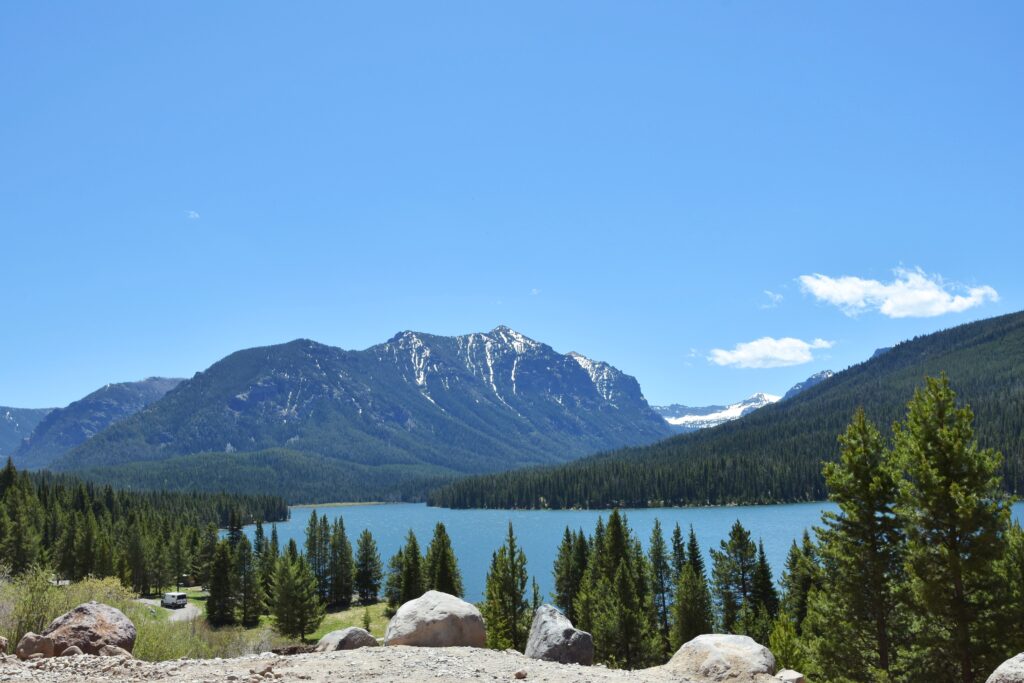Montana Memory Care: Specialized Communities for Dementia and Alzheimer’s Disease Care
In Montana, a considerable proportion of the population is aged 65 and older, reflecting the national trend of an aging demographic. Seniors in this state appreciate the availability of various senior living solutions, as their needs change over time. While nursing homes are a well-known option for senior care and housing, they are not the only one, especially for those dealing with cognitive decline. Memory care communities have emerged as specialized facilities providing a safe, comfortable environment for residents dealing with Alzheimer’s disease and other forms of dementia. These communities are designed to meet the unique needs of individuals with cognitive impairment, offering tailored care and attention to enhance their quality of life.
Montana offers several cities known for excellent healthcare and senior living options, such as Billings, Missoula, Bozeman, Helena, and Kalispell. These cities, among others, are home to a variety of memory care communities, giving seniors and their families diverse choices to find the care that best suits their needs.

Common terms that differentiate levels and types of senior living:
- Continuing Care Retirement Communities (CCRCs)- typically include independent living, assisted living, residential care and skilled nursing services all on one campus.
- Independent Living Communities – provide residents a setting without the burden of home ownership. Residents commonly live in fully equipped private apartments or cottages from a studio to large two-bedroom units.
- Care Home or Adult Family Care Home- are private residences in a home-like setting that provide care services to a smaller more limited number of residents (typically 5-12 residents, depending on each state’s regulations).
- Assisted Living- provides housing and supportive care in a community setting, but the residents do not require 24-hour nursing care.
- Memory Care- a care setting for residents with memory loss or confusion. The community typically has a “secured” entry for residents that may wander. This care can be provided in different care settings depending on the state licensing requirements.
- Skilled Nursing is state licensed to provide a safe, therapeutic environment for people who require rehabilitative care 24 hours a day.
Navigating Memory Care in Montana: Specialized Care for Alzheimer’s and Other Dementia Types
Memory care in Montana is often facilitated within specialized units in assisted living centers, overseen by the Montana Department of Public Health and Human Services. These units undergo regular checks to ensure compliance with state regulations and are designed to address the unique needs of residents requiring specialized dementia care, providing safety and support through trained staff and secure environments.
Memory care facilities in Montana feature:
- Surveillance at entry and exit points.
- Personal medical alert devices.
- Security measures, including keypad locks, to prevent wandering.
- Established safety protocols, such as secured doors.
Services in Montana’s Memory Care Units:
Montana’s memory care units are staffed with specially trained personnel providing 24-hour support. The services are crafted to meet the healthcare, daily living, and social needs of residents, promoting engagement and well-being through organized activities.
Services include:
- Assistance with daily living activities and medications.
- 24/7 access to trained nursing staff.
- Transportation for medical appointments and outings.
- Maintenance, meal preparation, housekeeping, and laundry services.
These comprehensive services and secure facilities aim to foster a sense of community and enhance the quality of life for residents living with dementia in Montana.
How much does memory care in Montana
In comparison to other states, Montana offers competitive pricing for memory care. The region’s cost tends to fluctuate, but on average, it remains relatively balanced with the national average.
National Average Monthly Cost for Memory Care: $5,635 Per month
- Billings: $4,800 per month
- Missoula: $5,000 per month
- Bozeman: $5,200 per month
- Helena: $4,700 per month
- Kalispell: $4,900 per month
Please note that these are just estimated figures based on the national average and regional cost trends. Actual costs can vary depending on the facility, specific services provided, and other factors. For the most accurate and up-to-date pricing information, contacting the memory care facilities in each city directly is recommended.

You want to consider your payment options for assisted living, memory care, and care homes. For these services, Medicare is NOT an option for payment.
The most common payment for these services would be out of pocket Private Pay and assessing a combination of retirement funds, personal savings, and pension payments.
Medicaid can also be an option, be sure to see if you or a loved one qualifies.
Long-Term Care insurance is also a possible option in cases of chronic conditions, be sure to see if you or a loved one qualifies.
For our Veterans and spouses of veterans, be sure to assess Veteran Aid and your eligibility for these benefits.
Medicare – NO:
- Medicare does NOT pay for Assisted Living.
- People 65 years and older and individuals with end stage renal disease are eligible for Medicare benefits, no matter their income.
- Coverage is meant for people in need of short-term care.
Private pay – YES:
- Many families pay for assisted living with private funds.
- Private pay can be a combination of retirement funds, personal savings, and pension payments.
- Family members may contribute funds to pay for assisted living or other senior housing and care.
Medicaid – MAYBE:
- Medicaid provides health coverage to millions of Americans. Eligible participants include: low-income adults, elderly adults and people with disabilities.
- Medicaid is administered by state, according to federal requirements. The program is funded jointly by each state and the federal government.
- Every state has their own individual Medicaid assistance program.
- National guidelines are in place do decipher how states must spend Medicaid money, but with allowances toward the guidelines.
- The state determines what levels of care will be covered by Medicaid, who is eligible, and how much the state will reimburse the care community.
- If you are unsure whether you qualify for Medicaid, you should apply. You may be eligible depending on your household income, family size, age, disability and other factors.
Long-term Care Insurance – MAYBE:
Long term care insurance is a great way to pay for assisted living, and planning ahead is important when considering how to pay for senior housing and care. Nearly 75% of people over the age of 65 will require long-term care and services at some point. Buying into long-term care insurance when a person is in their 50s and 60s is the most common time to do so.
- Long-term care insurance helps cover the costs of chronic medical conditions.
- Individuals and couples with the ability to pay into long-term care insurance have the advantage of a head start in allocating funds for senior care.
Veteran Aid and Assistance – MAYBE:
This benefit is available to some military veterans and surviving spouses who live in an assisted living community and those who have in-home care.
- There are specific guidelines, but a veteran may qualify for as much as $2,050 each month.
- A veteran with a sick spouse may be eligible for $1,600 per month.
- If a veteran has passed, their surviving spouse can qualify for $1,300 per month.

Questions to Ask
Finding a senior living community can be overwhelming. Here are some tips on things to be observant of:
- Make sure the facility is clean and well maintained. You can tell a lot about the operation by noting what is clean and maintained. Are doorknobs loose or damaged? Do you see any frayed carpet or trip hazards?
- Visit during lunch hour to observe what the residents are eating. Ask questions about the nutrition program. Is there diversity in meals, healthy fruits and vegetables served at all meals, drink options?
- Speak to residents and/or family members to learn their perspective.
- Ask about staff and resident engagement. Get a feel for how staff interact with residents.
- Ask about the life enrichment programs. Activities are crucial when it comes to quality of life and play a key role in care for older adults.
- And finally (along with a plethora of more things to consider), get to know the leadership in the building. If you feel good around the Executive Director, Head Nurse, Lead Activities Director and even the Chef or Janitor, it is a good sign you can trust them with the care of your loved one.
Resources and Links – Montana
Montana Office on Aging The Aging Service Bureau is housed in the Senior and Long Term Care Division under the Montana Department of Public Health and Human Services. The office is responsible for the administration of the Older American Act through the ten Area Agencies on Aging.
Area 2 Agency on Aging is an Adult and Disability Resource Center providing information and assistance to elderly individuals and adult individuals with a disability. They connect individuals to needed services, provide counseling on long term care needs, help with applications for assistance to various programs and help develop programs to meet the needs of local residents. Area 2 serves those in Judith Basin, Fergus, Petroleum, Wheatland, Golden Valley, Musselshell, Sweet Grass, Stillwater, Yellowstone, Caron, and Big Horn.
Area 5 Area Agency on Aging is an Adult and Disability Resource Center providing information and assistance to elderly individuals and adult individuals with a disability. They serve those in Beaverhead, Deer Lodge, Granite, Madison, Powell, and Silver Bow.
Missoula Aging Services Missoula Aging Services provides a wide array of programs and services for older adults, people with disabilities and those who care for them. As a one stop shop, comprehensive services and referrals are available (both an Area Agency on Aging and an Aging and Disability Resource Center). Programs include homemaker and respite services, hospital to home transitions, retirement services, personal consultations, help with Medicare/Medicaid/Social Security, transportation assistance, Meals on Wheels, liquid supplements, congregate (group) meals, farmers’ market coupons, veteran directed care, caregiver support groups, companions for older adults, hundreds of volunteer opportunities, certified local ombudsman (advocates), onsite resource library, community classes (Medicare workshops, training for caregivers, balance improvement), elder abuse prevention, and statewide Medicare fraud prevention.
Area 8 Agency on Aging It is the mission of Cascade County Aging Services to promote an enhanced quality of life for a diverse population of older adults residing in this community by providing a comprehensive and coordinated system of services such as information and assistance, Senior Medicare Patrol, State Health Insurance and Assistance (SHIP), congregate and home delivered meals.
Eldercare Locator This is a great resource to search for specific care in specific counties and cities. This database is a nationwide resource that connects older Americans and their caregivers with trustworthy local support resources. Connect with services such as meals, home care or transportation, or a caregiver education or respite from caregiving responsibilities. The Eldercare Locator is a public service of the Administration on Aging (AoA), an agency of the U.S. Administration for Community Living.
Medicare provides a search feature to find & compare providers near you, most senior housing and care providers are included on CareAvailability.com. Find & compare plans in your area. Determine if you qualify for premium savings
Medicaid offers information on how to apply for Medicaid, eligibility criteria, links to local state offices, and additional resources
The Alzheimer’s Association is the leading voluntary health organization in Alzheimer’s care, support, and research. Whether you are living with Alzheimer’s or caring for someone with the disease, information and resources are available.
Search other areas for Memory Care
Not finding what you’re looking for? Take a look below.
